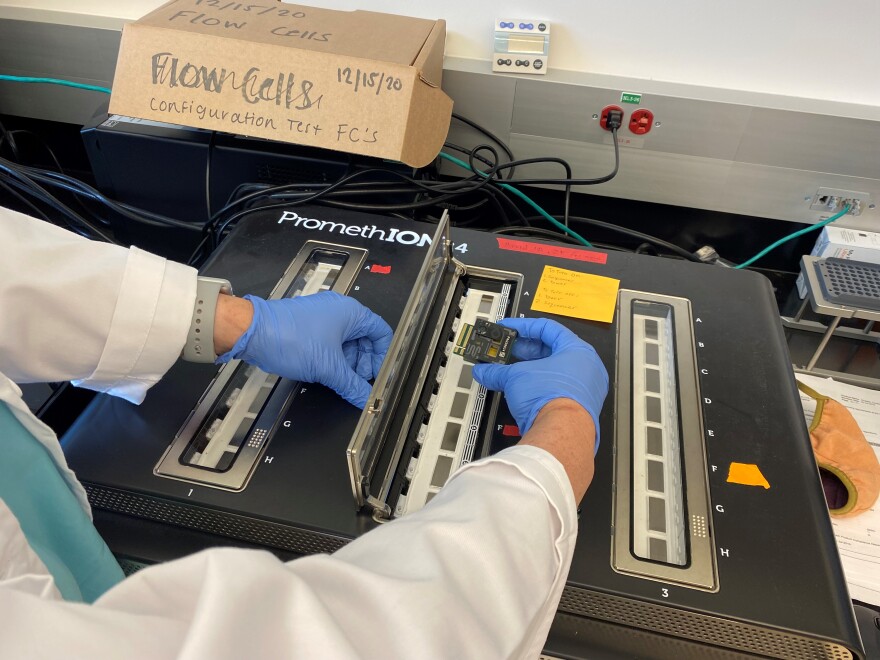Up on the third floor of the bioinformatics building at UNC Charlotte on a recent afternoon, a little robot was humming away in a lab.
The robot, essentially a glass box with a mechanical arm inside that moves back and forth, sat surrounded by counters and shelves crowded with scientific supplies like bottles of chemicals and racks of test tubes. White lab coats hung off the backs of some of the rolling office chairs.

Cynthia Gibas and Jessica Schlueter have recently spent many late nights in this lab. Both faculty members in UNC Charlotte’s College of Computing and Informatics, they lead the university’s search for new coronavirus strains in the Charlotte area.
The coronavirus is always changing and mutating. In recent weeks, the highly contagious delta variant has eclipsed other strains of the virus, leading to a rapid rise in cases and hospitalizations locally and across much of the globe.
Gibas and Schlueter are working with the Mecklenburg County Health Department and using a lab process called sequencing to try to predict the virus’ next local move.
The Sequencing Process
First, Schlueter picks up a batch of anonymous coronavirus samples from StarMed Healthcare — roughly 200 each week — of people who have tested positive in the county.

“We go down there with a container with dry ice because these are RNA samples and we want to make sure that they stay frozen so they don’t degrade,” Schlueter said.
Back at the lab, researchers take the RNA samples and do a couple of processes that make their genetic code easier for their machines to read. Then they take them over to the robot, which researchers have nicknamed “Hal,” to do what’s called a dilution, or using a large eyedropper called a pipette to water down the samples and make sure that there’s roughly the same amount of genetic material in each.
“We used to do (the dilutions) by hand. It’s an arduous and eye-breaking process,” said Schlueter. “Initially it was Dr. Gibas and I sitting at the bench and she’d read me numbers and I was pipetting samples between wells.”
She added, laughing: “So we love the robot.”
When Hal finishes, researchers do a few other steps to clean up the samples and make them easier to read and then they start the actual sequencing. A group of 96 samples is loaded onto a small chip that looks like a printer ink cartridge.
“We load on about a hundred femtomoles of sequence,” Schlueter said.
“Which is a very, very small number — that’s all you need to know,” interjected Gibas, chuckling.
Researchers put the chips into a machine they call “Big Bird”— officially, a PromethION 24 sequencer. The sequencer reads each coronavirus test sample some 400,000 times and writes down all of each sample’s genetic material as a long list.
‘Figure Out What’s Causing The Outbreak’
Once the sequencer has generated the lists of genetic material in each sample, researchers can line up all of the lists and look for patterns using computers.
Different coronavirus variants have different genetic patterns. By comparing the genetic lists, Gibas said, she and her team can determine which variant someone had.
“Maybe once or twice we’ve seen something that’s, like, ‘Ooh, I never saw that one before. Let’s take a look at what that is.’ But it’s still something that’s been seen somewhere. It’s not something that nobody else has ever seen,” Gibas said.

Genetic sequencing isn’t a new technology. UNC Charlotte started experimenting with using it to sequence the coronavirus around January, not long after the variant first identified in the United Kingdom — now known as the alpha variant — started spreading.
When Gibas and her team complete the sequencing for a sample in Mecklenburg County, they send that information back to local officials, like when there was a COVID-19 outbreak at a Salvation Army homeless shelter in Charlotte earlier this summer. County health director Gibbie Harris said the results showed at least five of the 30 cases were the delta variant.
“When we have outbreaks, it’s good to know that we can send samples and figure out what’s causing the outbreak,” Harris said.
The sequencing information the UNC Charlotte team collects is also uploaded to an international database to help researchers across the world watch for patterns.
For Gibas and Schlueter, the sequencing process in the lab is time-consuming but also energizing. They said it’s fun to be learning new things as scientists and also contributing something to the rest of the world.
“We get to act like graduate students up here at 9 o’clock, loading sequencing chips and eating pizza waiting for data to come off the machine,” Schlueter said.
But, she quickly added: “Not eating pizza in the lab — eating it in the foyer.”



